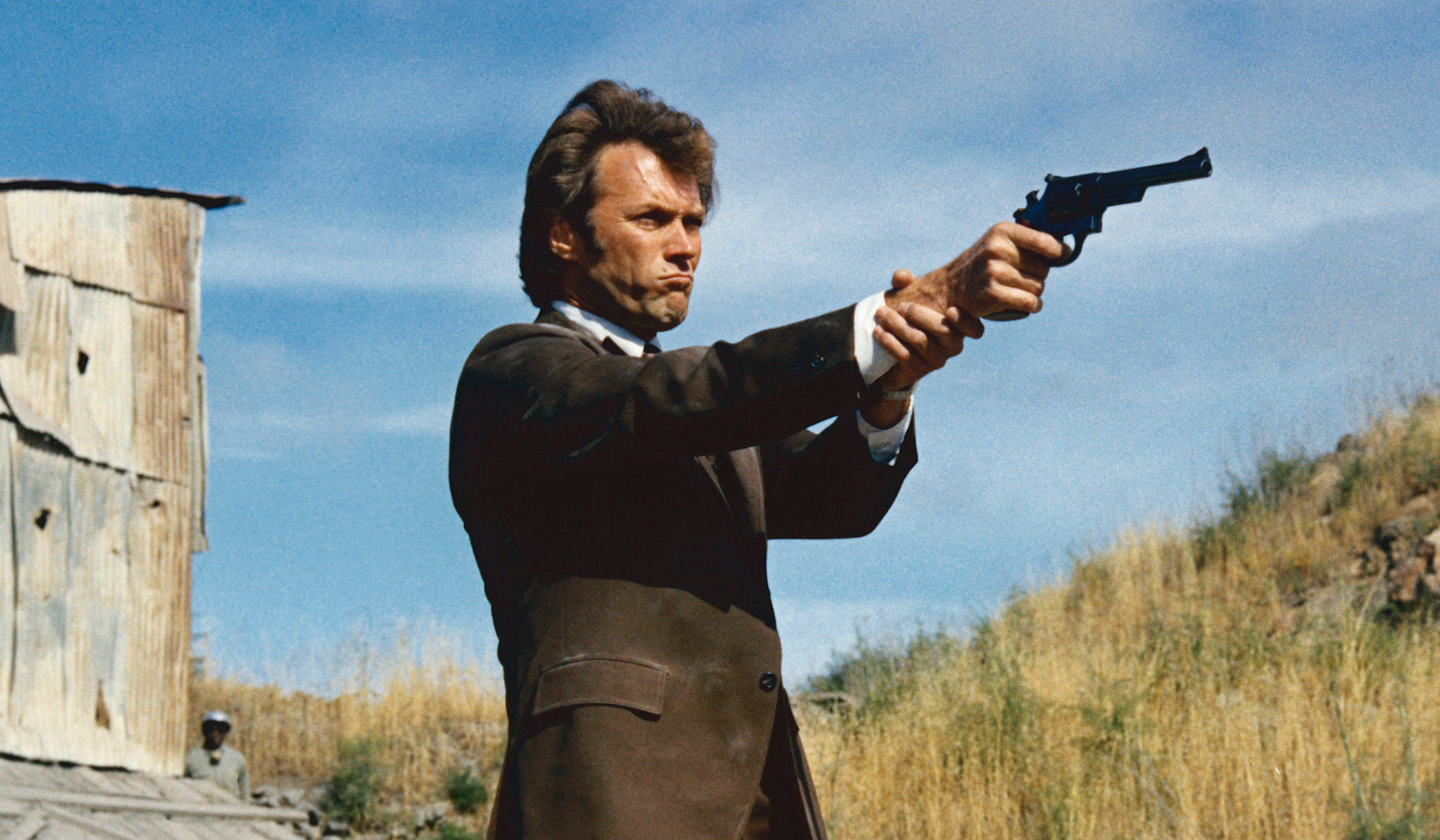
Down these mean streets a man must go who is not himself mean, who is neither tarnished nor afraid. The detective in this kind of story must be such a man. He is the hero; he is everything. He must be a complete man and a common man and yet an unusual man. He must be, to use a rather weathered phrase, a man of honor — by instinct, by inevitability, without the thought of it, and certainly without saying it.
So wrote Raymond Chandler in a 1944 Atlantic Monthly essay, “The Simple Art of Murder,” in which he defended the fiction genre he had come to master, the detective story. Chandler died in 1959, eleven years before the first screen appearance of the detective he surely would have admired and who almost precisely fit this description: Inspector Harry Callahan of the San Francisco Police Department, better known as “Dirty Harry,” played by Clint Eastwood.
Dirty Harry premiered 50 years ago in a time of social upheaval and rising crime, conditions very much resembling today’s. Inspector Callahan was a man whose feet were planted in one era while his eyes beheld another, one he did not find pleasing. He harbored a smoldering contempt not only for the criminals whom he saw unraveling society’s fabric, but also — and perhaps even more so — for those he viewed as abettors in the unraveling, the spineless police brass and inordinately legalistic district attorneys and judges.
I say Harry Callahan almost precisely fit Chandler’s description because he was in fact tarnished, willingly, even eagerly so. He was not tarnished in the sense that he was corrupt — perish the thought! — but because, in performing his job as a homicide detective, unlike the office-dwellers he disdained, he sometimes entered situations in which his only choice was between the commission of two wrong acts, one illegal, the other immoral. He accepted the stain of having acted illegally as the price of acting morally.
The main storyline of Dirty Harry involves Callahan’s pursuit of “Scorpio,” a serial killer loosely modeled on the still-unsolved “Zodiac” murders committed in and around San Francisco in the late 1960s. Chillingly played by the harmless-looking Andy Robinson, Scorpio holds the city in fear after randomly shooting two people with a sniper rifle. When he kidnaps a teenage girl and holds her for ransom, claiming she is hidden underground with only a few hours of breathable air left to her, Callahan is dispatched to deliver the payment.
Scorpio directs Callahan from one payphone to another across the city before they finally meet face to face near the cross on Mount Davidson. Rather than accept the ransom and release the girl, Scorpio brutally assaults Callahan and tells him he’s going to let the kidnapped girl die. Callahan produces a hidden knife and stabs Scorpio in the leg, but Scorpio escapes.
Callahan tracks him down to the abandoned Kezar Stadium, former home of the San Francisco 49ers. Entering the killer’s lair without a search warrant, Callahan pursues Scorpio onto the football field, where in a cinematically brilliant scene he shoots him in the leg.
It is here that Callahan must choose between doing what is legal and what is moral. Aware that the kidnapped girl will die if not found soon, Callahan extracts a confession from Scorpio by stepping on his wounded leg. The girl is found, though already dead, and Callahan is upbraided by the district attorney and a judge, who tell him that no case can be brought because of his transgressions. “The suspect’s rights were violated,” says the judge, “under the Fourth and Fifth and probably the Sixth and Fourteenth Amendments.”
“And Ann Mary Deacon,” says Callahan, of the murder victim. “What about her rights?”
With this, Callahan speaks for many today who see the criminal-justice pendulum as having once again swung too far in the direction of coddling criminals. San Francisco is home to district attorney Chesa Boudin, one of the George Soros–funded “progressive” prosecutors lately installed here and there across the country, overseeing dramatic crime surges in their respective cities. San Francisco’s homicides have increased 17 percent so far this year, coming on top of a similar increase in 2020. What would an updated Harry Callahan have to say about that?
But of course there will be no updated Harry Callahan, no matter how eager the moviegoing public might be to embrace one. In today’s Hollywood, where woke reigns supreme, it is unthinkable that such a character would be brought to the screen, though one can imagine a studio pitch meeting where Callahan is envisioned as a woman or gay or transsexual or some acceptable amalgam of all three. “How about,” a screenwriter might propose, “if we have Harry take up ‘Alice’ on his offer of a quickie on Mount Davidson?”
No, thank you. I’ll stick with the original.
Raymond Chandler concludes his description of the ideal detective thus:
He is a relatively poor man, or he would not be a detective at all. He is a common man or he could not go among common people. . . . He will take no man’s money dishonestly and no man’s insolence without a due and dispassionate revenge. . . . He has a range of awareness that startles you, but it belongs to him by right, because it belongs to the world he lives in. If there were enough like him, the world would be a very safe place to live in, without becoming too dull to be worth living in.
That is Harry Callahan, whose exploits in Dirty Harry and its four succeeding films in the franchise are as enjoyable today as ever. He remains, 50 years later, a supremely entertaining man of honor.